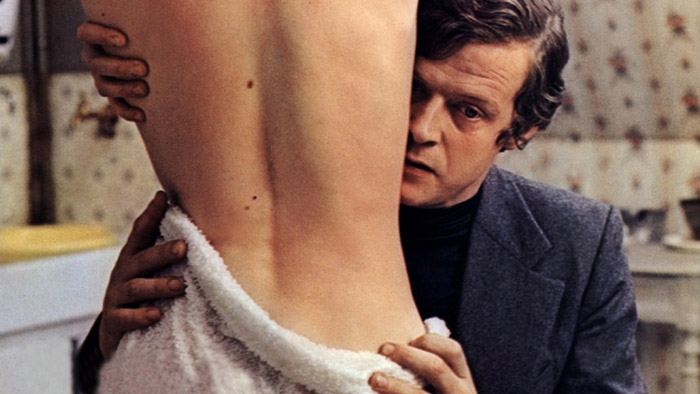Love in the Afternoon (L’Amour L’Après Midi) (1972) is the last of French New Wave director Eric Rohmer’s series of comedies known as the “Six Moral Tales.” Though Rohmer was initially overshadowed by big names in the French New Wave such as Chabrol, Godard, and Truffaut, he developed a name for himself with his distinctly realistic style. Rohmer praised cinema as a privileged art form, saying in an interview that films “most faithfully transcribe the beauty of the real world.” Rohmer’s keen cinematic eye brings a clear interpretation of reality to the screen, which serves as a refreshing juxtaposition to today’s highly stylized Hollywood films.
The colourful characters in Love in the Afternoon give the film its unique charm. Rohmer’s style is to take archetypal figures—in this case the discontented married man, the bored housewife, and the seductive temptress—and transform them into complex individuals with blood pumping through their veins.
The film’s hero is Frédéric (Bernard Verley), a pleasant business executive who almost resembles American Beauty’s Lester Burnham (Kevin Spacey) in his dissatisfaction with conjugal love and banal daily life. While his marriage to wife Hélène (Françoise Verley) consists of mutual respect and simplicity, Frédéric is nonetheless drawn to the sea of beautiful women passing through Paris on his daily commute to work. Observing the ladies sitting by him on the train, Frédéric remarks: “When I see a woman, I’m no longer able to classify her as easily among the chosen or the outcasts. I can’t recall on what criteria I based my judgment. What was that ‘something’ that a woman had to have to attract me and that I could detect at first glance?”
Frédéric questions his decision to love Hélène when there exists a plethora of other women who may contain that same “something.” As Rohmer’s films tend to delve into philosophical realms, he appears to be highlighting the tension between Hélène’s role as a wife and her role as a person, and forces the audience to look at the moral implications of this.
Suddenly, Chloé (fabulously played by Zouzou) enters the picture by arriving at Frédéric’s office one day. An old flame of his, she embodies the opposing forces of lust and desire over those of marriage and devotion. As Frédéric’s work schedule leaves him ample time for lunch breaks—in typical French bourgeoisie manner—Chloé and Frédéric meet in the afternoons. They talk and flirt, though not enough to threaten Frédéric’s conjugal piety. With Rohmer’s ability to create mesmerizingly complex characters, Chloé proves to have both an intrusive and passive presence in Frédéric’s life—always there, yet popping in and out at the right times. Chloé finds Frédéric’s love for his wife to be an act, telling him: “You love her—if you really do—because you’re supposed to. I couldn’t stand being loved like that […] I won’t accept compromises. But since you’re so bourgeois, act the part.”
To that, Frédéric responds: “In a polygamous society, I’d be polygamous.”
Aside from Rohmer asking us if conjugal love is all performance and if monogamy is merely a dull act of conformity, he also uses his visionary talent to create an outstanding viewing experience. Though the film is in French and many English-speaking eyes may be drawn toward the subtitles at the bottom of the screen (as Rohmer does rely heavily on verbal wit), the imagery of the film should not be disregarded. In a particularly poetic scene, the camera floats around Frédéric, who weaves through a Paris crowd, as a melodic voice-over runs, comparing the energy of the city commuters to the current of the sea. Rohmer also makes deliberately smart stylistic choices, such as always strategically framing Hélène with her children by her side, creating an image of Frédéric’s familial duties and responsibilities to matrimony. Additionally, Rohmer avoids shooting in close-up as a way of distancing the audience and allowing the viewer to decide whether or not to trust his multidimensional, intriguing characters.
Rohmer’s ability to turn the mundane into a visually intriguing, psychological story is encapsulated in Love in the Afternoon. The plot, simply relatable and concluding into a scene so empathetically pitiful, cements this film as a long-lasting romantic classic.








